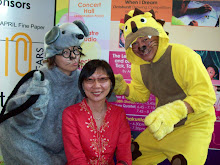"Folksonomies in Library Catalogues : A Workshop"
Speakers:
i) Isabella Peters, Researcher, Department of Information Science of the Heinrich-Heine-University Düsseldorf, Germany
ii) Professor Dr. Wolfgang G. Stock, Professor & Head of Department of Information Science at the Heinrich-Heine-University Düsseldorf, Germany
Date : 9 February 2009 (Monday)
Time : 9am - 12 noon
Venue : Possibility Room, Level 5, National Library Building
Speakers Profile
Isabella Peters
M.A. A researcher at the Department of Information Science of the Heinrich-Heine-University Düsseldorf.
Her main research focuses the topic Web 2.0, especially the use and characteristics of folksonomies in terms of indexing and searching, and the application of blogs, podcasts, wikis and social networking services in corporate knowledge management and blended learning.
She gave speeches on folksonomies in Frankfurt, Germany (Book Fair), London, GB (Online Information), Milwaukee, WI, USA (ASIS&T Annual Meeting), Graz, Austria (Triple-I Conference) and Amherst, MA, USA (Center for Intelligent Information Retrieval).
Contact:
Heinrich-Heine-University Düsseldorf, Dept. of Information Science – Universitätsstr. 1, (Bldg. 23.21/ 04.68) – D-40225 Düsseldorf, Germany.
E-Mail: isabella.peters@uni-duesseldorf.de
Homepage: http://www.phil-fak.uni-duesseldorf.de/infowiss/content/mitarbeiter/peters.php
Professor Dr. Wolfgang G. Stock
Professor for information science and the head of the Department of Information Science at the Heinrich-Heine-University Düsseldorf.
He teaches in the degree program "Information Science and Language Technology" (Bachelor, Master and PhD-Studies).
Wolf has written more than 200 articles and books on knowledge representation, information retrieval, information market (especially on online information suppliers) and informetrics.
Recent books on Information Retrieval (2007) and Knowledge Representation (2008) appeared at the publishing house Oldenbourg (Munich).
He is editor of the new book series "Knowledge and Information – Studies in Information Science", which is published by Saur (an imprint of DeGruyter, Berlin and New York). At the time, he is engaged in two research projects, namely Emotional Informational Retrieval (EmIR) and the role of folksonomies in information science.
Contact:
Heinrich-Heine-University Düsseldorf, Dept. of Information Science – Universitätsstr. 1, (Bld. 23.21 / 04.63) – D-40225 Düsseldorf, G ermany.
E-Mail: stock@phil-fak.uni-duesseldorf.de or stocknmw@aol.com
Homepage: http://www.phil-fak.uni-duesseldorf.de/infowiss/content/mitarbeiter/stock.php
Workshop Outline
Lesson 1
1. Folksonomies – Indexing without rules (with practical work of the participants).
2. Folksonomies in information services and library catalogues.
Lesson 2
3. Folksonomies and knowledge representation.
4. Folksonomies and information retrieval.
Lesson 3
5. Tag Gardening for folksonomy enrichment and maintenance.
6. Find "more like me"! The social function of a folksonomy.
What I had learned:
After attending the workshop, I understand the term "Folksonomy" is "Folk + taxonomy".Recalling what we learned in library school, it is like free text indexing by common folk.
To understand it better, you may like to read what I clip from wikipedia:
"Folksonomy (also known as collaborative tagging, social classification, social indexing, and social tagging) is the practice and method of collaboratively creating and managing tags to annotate and categorize content. Folksonomy describes the bottom-up classification systems that emerge from social tagging. In contrast to traditional subject indexing, metadata is generated not only by experts but also by creators and consumers of the content. Usually, freely chosen keywords are used instead of a controlled vocabulary.[2] Folksonomy (from folk + taxonomy) is a user-generated taxonomy."
Source of information:
http://en.wikipedia.org/wiki/Folksonomy
As someone who searches databases for decades. I can see the popularity of folksonomy will generate a lot of work for Librarians or Information Professional in record cleaning and record management.
If these type of work can be translated to "Jobs" for Librarian or Information Professional , I am optimitic that Librarian or Information Professional will be in great demands in future.
Here are some criticism on Folksonomy I read from wikipedia:
"Folksonomy is criticized because its lack of terminological control causes it to be more likely to produce unreliable and inconsistent results. If tags are freely chosen (instead of taken from a given vocabulary), synonyms (multiple tags for the same concept), homonymy (same tag used with different meaning), and polysemy (same tag with multiple related meanings) are likely to arise, lowering the efficiency of content indexing and searching.[4] Other reasons for meta noise are the lack of stemming (normalization of word inflections) and the heterogeneity of users and contexts.
Classification systems have several problems: they can be slow to change, they reflect (and reinforce) a particular worldview, they are rooted in the culture and era that created them, and they can be absurd at times. Idiosyncratic folksonomic classification within a clique can especially reinforce pre-existing viewpoints. Folksonomies are routinely generated by people who have spent a great deal of time interacting with the content they tag, and may not properly identify the content's relationship to external items."
Source of information:
http://en.wikipedia.org/wiki/Folksonomy
Professional Development Scheme (PDS) Points
LAS Professional Development Scheme points: 46
(Only applicable to librarians who are participants of the scheme)
Notes: Eligible for PDS Points
Each of these activities attract 46 points under the Industry Knowledge Development (ID) category."Participate in library related talks, forums, discussion sessions and business meetings (e.g. AGM, Council & Committee meetings) organized by LAS or other libraries (provided they are open to LAS members or other librarians)"


No comments:
Post a Comment